Early Season Pests
Katelyn Miller, Field Crops and Forage Specialist
Southwest New York Dairy, Livestock and Field Crops Program
CORN PESTS:
Black Cutworm
There are several species of cutworm found in NYS, but black cutworm (BCW) is the most common. The adults migrate from southern overwintering sites on spring storms. They lay eggs on cover crops, grassy weeds, and winter annuals like chickweed and purple deadnettle. Although several generations can occur, the first generation causes economic loss in the state.
BCW larvae are nocturnal, feeding at night on young corn plants. Their damage is characterized by missing, cut, or wilted plants. If you notice this damage, try digging near the affected plants to look for the larvae. The key to managing BCW is to scout for damage. Fields that favor outbreaks include late planting, weed infestations, low, wet areas in the field, and those that were previously sod. Typically, the threshold for cutworm damage is 5% feeding to warrant an insecticide application, but this can vary with corn development.
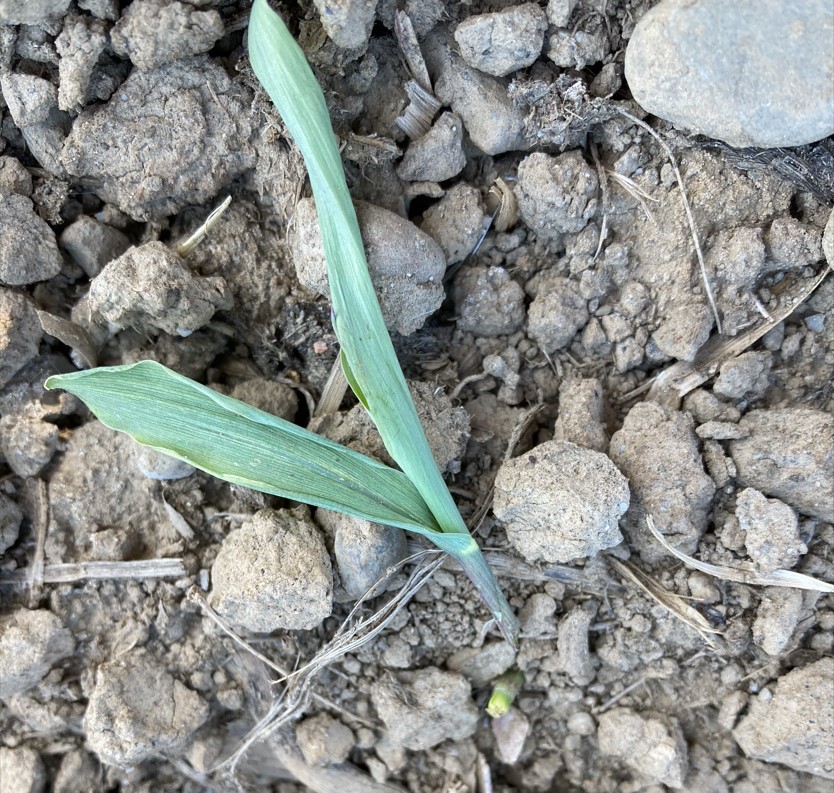
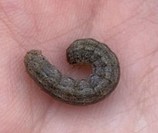
Birds
Birds can be a pest to young plants because they pull the corn out of the ground. They do this because they are looking for the seed at the base of the root. Indicators that birds have been feeding in the field is evidence of feces, rows of plants pulled from the ground like shown in the picture below, and clipped plants.
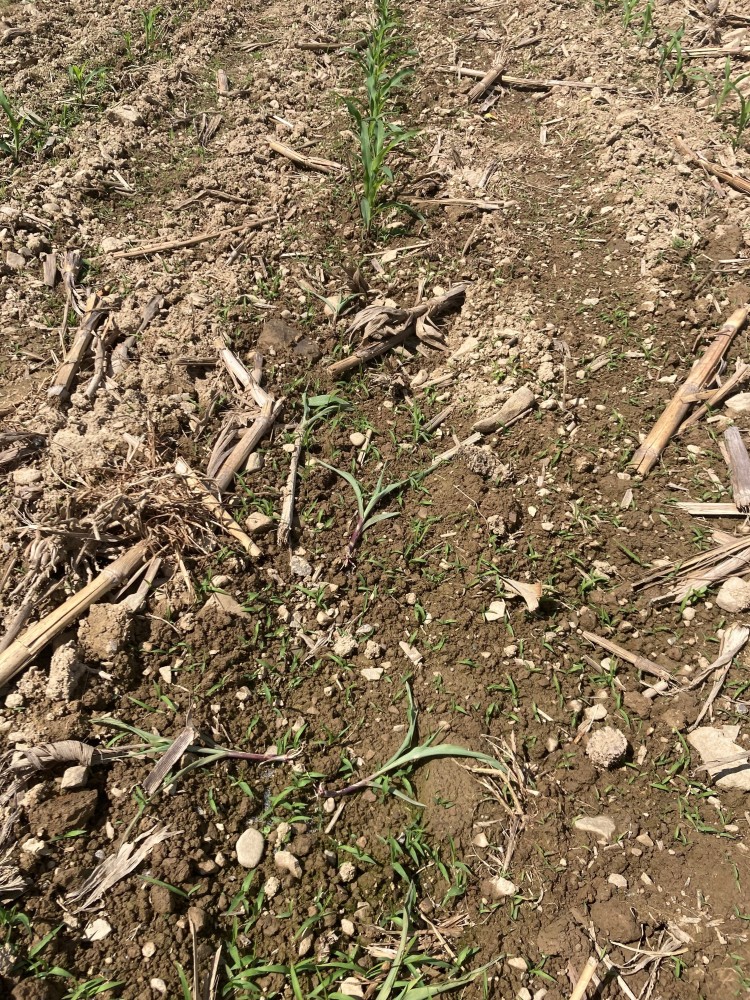
SOYBEAN PESTS:
Soybean Aphids
Soybean aphids are small yellow-green insects that feed on soybean plants throughout the season. They begin feeding in mid-June, which makes scouting important. If you are experiencing stunted plants, misshapen leaves, or see ants and lady beetles, these are signs that aphids are present in your field. Aphids are usually found on the underside of the plant and on uncurling leaves, so pull plants and evaluate these areas. The threshold for aphids is 250/plant. Avoid tossing in an "insurance" application of insecticides because it will kill many beneficial insects that keep other insect populations such as spider mites, in check.
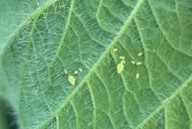
Slugs
Slug damage can be present on both corn and soybeans. Typically, slugs will feed on plants in fields with high residue such as weedy fields, no-till, and fields that were sod the previous year. Slug damage is often more present during cool, moist springs. There are no economical treatments for slugs, so preventing their presence through factors like residue management can help to reduce damage.
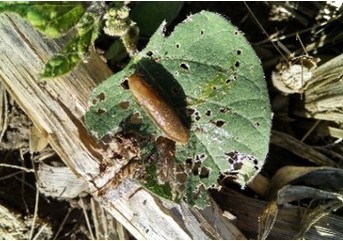
***Photo from M. Stanyard
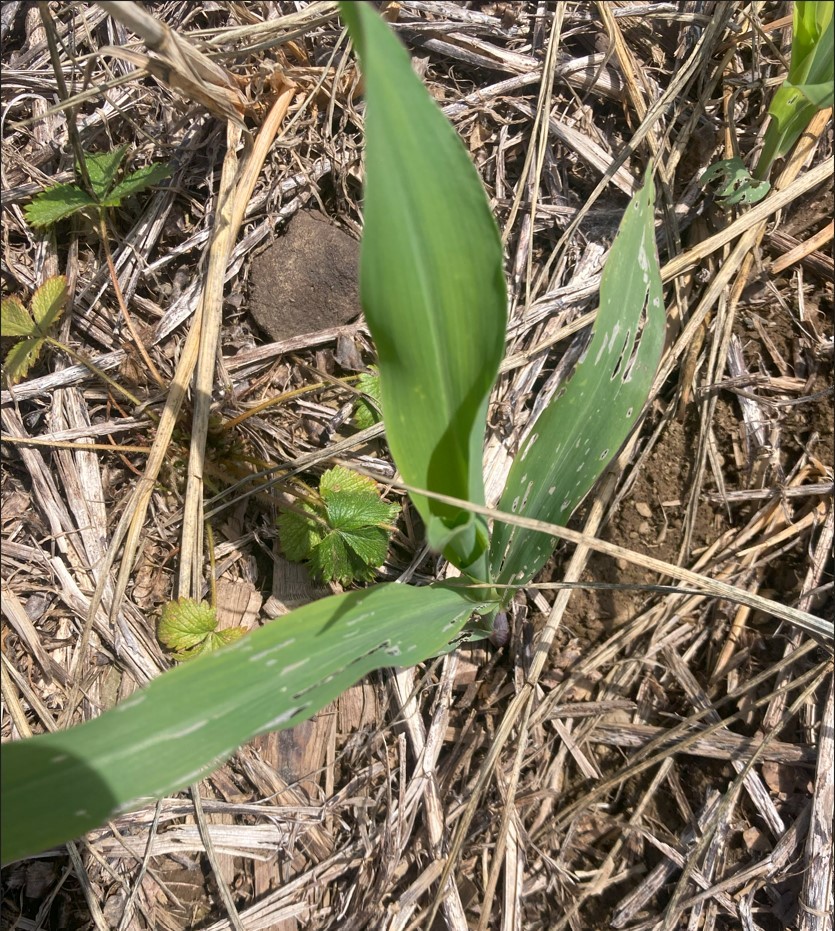
FORAGE PESTS:
Potato Leafhopper
Potato leafhopper (PLH) is a green insect that is 1/8" long. They feed on newly established fields and regrowth, making them a serious economic pest in NY. The pest arrives in mid-May to late June on spring storms and feeds on alfalfa by removing sap from the plants. This feeding reduces the plants' ability to photosynthesize but also injects a toxin into the plant. This injection of toxin is how the characteristic "hopper burn" develops. Scout for PLH with a sweep net throughout the summer, making a few sets of 10 sweeps throughout the field. Compare your findings to the threshold chart below and make an insecticide application if warranted. If you are experiencing consistent PLH feeding damage on your farm, consider planting a resistant variety.
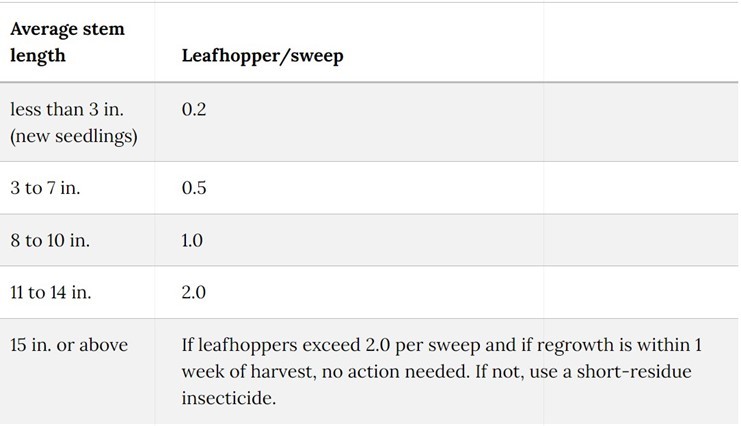
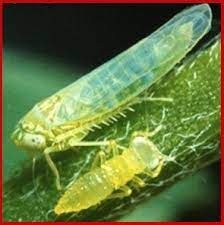
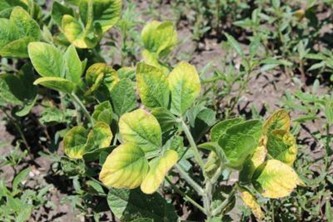
*** photo on top from University of Wisconsin, photo on bottom from Iowa State University
Alfalfa Weevil
 Alfalfa weevil overwinters in NY, and in mid-May the adult's lay eggs on the lower stem of the plant. Their development is completed by late May to mid-June, making second cutting regrowth vulnerable to damage. Typically, alfalfa weevil feeds on established stands instead of new seedings, so focus scouting efforts on those fields. While walking through a field, pick 50 stems at random. Look for their feeding patterns, characteristically known as a "shot hole" in the buds and upper leaves. If you notice that 50% of plants show signs of feeding, an insecticide application may be warranted.
Alfalfa weevil overwinters in NY, and in mid-May the adult's lay eggs on the lower stem of the plant. Their development is completed by late May to mid-June, making second cutting regrowth vulnerable to damage. Typically, alfalfa weevil feeds on established stands instead of new seedings, so focus scouting efforts on those fields. While walking through a field, pick 50 stems at random. Look for their feeding patterns, characteristically known as a "shot hole" in the buds and upper leaves. If you notice that 50% of plants show signs of feeding, an insecticide application may be warranted.
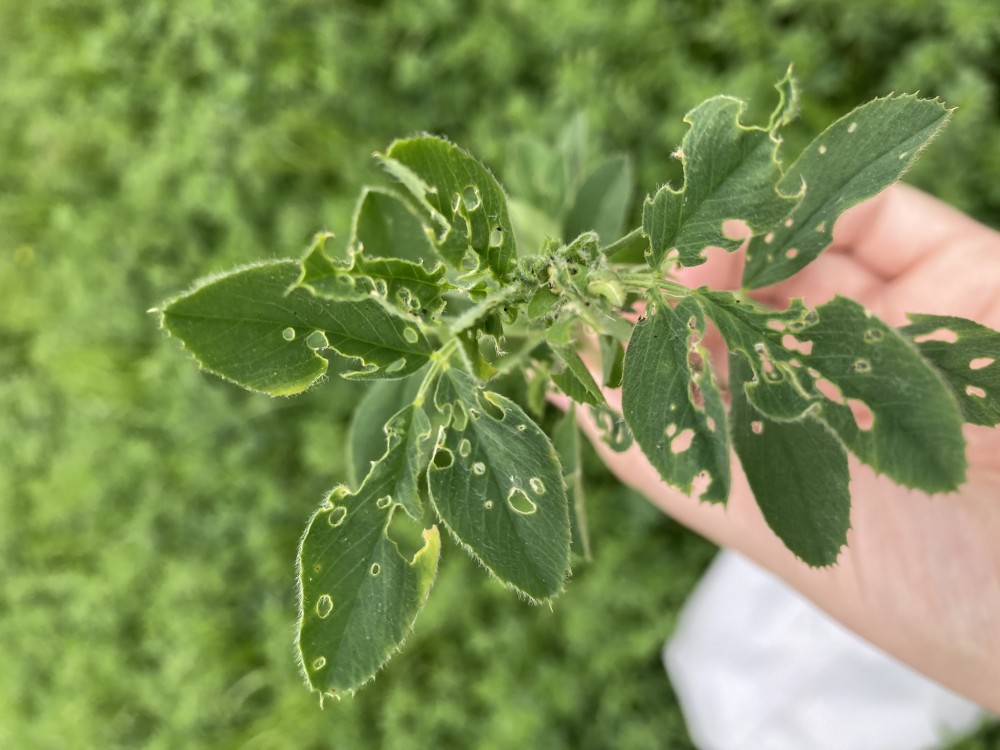
Common Armyworm
A new addition from last year is Common Armyworm (CAW). This pest feeds on winter grains, grassy fields, and even corn. Our pheromone trapping network has caught significant flights of this pest over the past few weeks, making your fields high risk as larvae are now large enough to cause noticeable damage. Plants will develop a ragged appearance and severe feeding pressure can decimate whole fields. When scouting, look in the residue at the base of the plant to find the larvae.
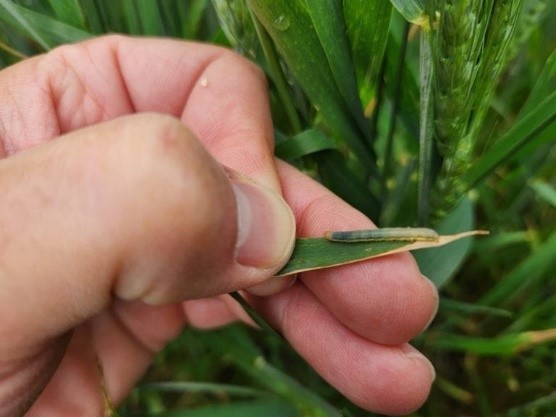
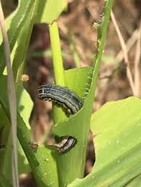
Photo on top from M. Stanyard, photo on bottom from UMN Extension
If you're interested in more information about thresholds, want more information about scouting for these pests, or you have concerns about these pests in your fields, reach out to Katelyn Miller at 716-640-2047 or km753@cornell.edu.
Upcoming Events
Boots in the Barn: Cornell Dairy Research Updates
January 13, 2026
January 20, 2026
January 27, 2026
February 3, 2026
February 10, 2026
February 17, 2026
February 24, 2026
Join us for some or all!
Webinar: Converting Old Dairy Barns into swine Facilities
January 21, 2026 : Webinar: Converting Old Dairy Barns into swine Facilities
Tim Terry, Farm Strategic Planning Specialist with Cornell's Pro-Dairy program will share information on what it takes to transition an old dairy barn for swine production. We plan to cover flooring, ventilation, and lighting, considerations for system workability, and more! Registration is free.
Southern Tier Crop Congress
January 28, 2026 : Southern Tier Crop Congress
Belfast, NY
Join SWNYDLFC and CCE Allegany County for the upcoming Southern Tier Crop Congress. CCA and DEC credits are available!
Announcements
Cows, Crops & Critters Newsletter Sponsorship
TRYING TO REACH GROWERS AND AGRIBUSINESSES IN OUR SOUTHWEST REGION OF NEW YORK?Weekly Email Update: Shared with 625+ households who have signed up with our program.
Monthly Paper Mailer: To reach our stakeholders and farmers who lack internet access, we send out a monthly mailer where your company's logo and contact information would be featured with a mailing list of 330+ households.
If you sponsor our weekly and monthly publications you reach approximately 955 households.





